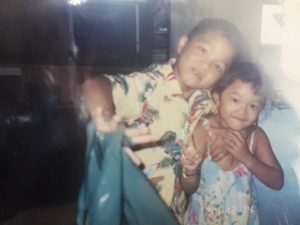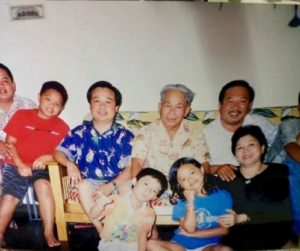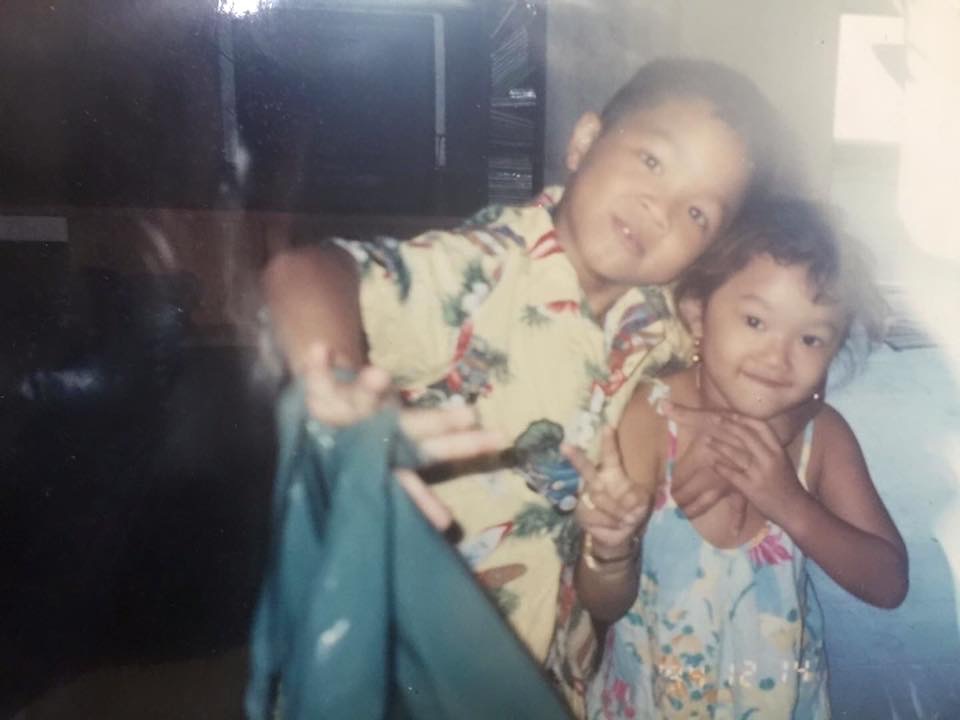Please kindly allow me to introduce myself as Ocean Le, an aspiring health professional with the goal to improve the lives of older adults and their families. My interest in the field is embedded in the rich foundation of knowledge that has not been fully understood by the public. As a first-generation student of two immigrant parents, I have seen the detrimental effects of limited access to health care both domestically and internationally. This has inspired me to improve access to both health care and health care information – empowering people involved in the process of care.

Ocean (left) and his sister, Jenni, in their childhood home. (Photo courtesy of Ocean Le)
My interest began in Honolulu, Hawaii, as an intermediate student at a Roman Catholic School. As a section 8 housing kid, I was forced out of my comfort zone, juxtaposed amongst those coming from a higher socioeconomic class. At school, I was embarrassed of my upbringing, and in my housing project, I was ridiculed for trying to better my life. My biggest fear was also my biggest motivation: to be exposed as an uneducated, second class citizen has motivated me to transcend beyond an ordinary education. I found comfort in those who were older than me, such as the school’s religious brothers and my mother’s friends, who were able to comprehend the value of what I was trying to do for my family and me. These people became my inspiration providing me with stories and lessons from their lives that are invaluable to me. These adults were vessels of knowledge and empathy in my life and I am eternally grateful for them.
After obtaining my high school diploma, I left Hawaii for Northeastern University in Boston.
It was during my freshman year in college that my grandfather passed away. A veteran of the Vietnam war, my grandfather lived in the countryside of southern Vietnam. When he became sick, he had to travel to a local clinic which referred him to a hospital that was an additional five hours away. With no other options, he was forced to go to the hospital, where he was diagnosed with an early stage of liver cancer. He was misinformed of the severity of his cancer, was prescribed oral medicine, and was told to return in two months. With no additional resources to fully understand his condition, my grandfather trusted the doctors’ recommendations, unaware that cancer had no cure.

Ocean’s grandfather (seated, second from right) and uncles visit the Le family. (Photo courtesy of Ocean Le)
He returned to the hospital a few weeks later and was informed that the cancer had spread to his colon. Unfortunately, my grandfather passed away several months later. Although I am unable to comment on the doctor’s intentions, my grandfather’s death could have been avoided if he had the resources to help him understand the severity of his disease and his treatment options. In underdeveloped countries, there are many disparities that obstruct proper access to both healthcare and healthcare information. My grandfather’s tale is a common story that has taken the lives of those living in similar conditions. Since my grandfather’s passing, I have lost a great uncle and a great aunt to similar fates. Their stories are one of my main motivations to improve access to healthcare and resources that are vital for older adults and their families.
To understand the geriatric landscape in the US, I accepted an internship position at The John A. Hartford Foundation. The Foundation focused on improving the lives of older adults, specifically in three primary focus areas: age-friendly health systems, family caregiving, and serious illness and end of life care. As an intern, I was involved in both research and marketing efforts, which meant it was one of my primary responsibilities to advocate and to promote the Foundation’s efforts in these three focus areas. I learned about the strengths of communication as these articles brought people together to support a common cause. It was comforting to see that people were understanding the growing concern for the field of geriatrics as these articles were picked up and mentioned by media outlets such as The New York Times and The Huffington Post. My tenure at The John A. Hartford Foundation was pivotal in my comprehension of the geriatric landscape in the United States.
Throughout my entire life, I have been impacted and helped by older adults. As I start this new chapter of my life with the Diverse Elders Coalition, I am happy to be in a position to give back and help improve the lives of ethnically and racially diverse older adults who represent my family and me.
The opinions expressed in this article are those of the author and do not necessarily reflect those of the Diverse Elders Coalition.

